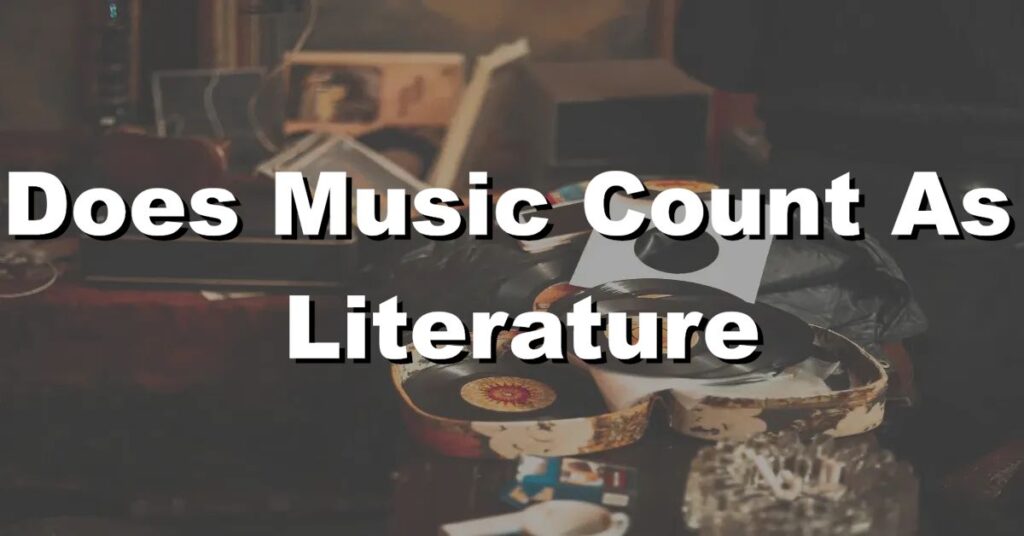In this blog post, we will explore the relationship between music and literature, and whether or not music can be considered a form of literature.
We will examine the similarities and differences between the two art forms and discuss the various ways in which they can be used to convey meaning and emotion.
Examining the Lyrical Quality of Modern Popular Music: A Case for Its Inclusion in Literature
Modern popular music often faces criticism for its perceived lack of depth and artistic value. However, a closer examination of its lyrical quality reveals a compelling case for its inclusion in the realm of literature. Just like poetry or prose, song lyrics convey emotions, narratives, and social commentary in a condensed and accessible format.
They utilize metaphor, symbolism, and vivid imagery to evoke meaning and provoke thought. From the introspective musings of singer-songwriters to the anthems that capture collective experiences, popular music encapsulates the human condition and serves as a powerful form of storytelling.
By recognizing the literary elements and poetic craftsmanship embedded within song lyrics, we can appreciate popular music as a legitimate and vibrant artistic medium that contributes to the broader tapestry of literature.
The Art of Storytelling in Music: Exploring the Literary Elements of Songwriting
At the heart of music lies the art of storytelling, where songwriters craft narratives and convey emotions through their lyrics. Songwriting shares common ground with literature, employing literary devices such as characterization, plot development, and thematic exploration.
Through carefully chosen words and compelling imagery, songwriters transport listeners into vivid worlds and invite them to engage with profound human experiences. From ballads to concept albums, each song becomes a chapter in a larger narrative, offering a glimpse into the artist’s thoughts, feelings, and observations.
The interplay between lyrics, melody, and instrumentation creates a multi-dimensional storytelling experience that resonates deeply with audiences. By delving into the literary elements of songwriting, we can unlock the artistry and literary merit embedded within the fabric of music.
An Analysis of the Interplay between Words and Sound
In the realm of music, words and sound intertwine to create a rich tapestry of meaning and emotion. While lyrics provide the verbal expression of a song’s message, the musical elements enhance and amplify its impact.
The melodic contour, harmonies, rhythm, and dynamics work in harmony with the lyrics to evoke specific moods, accentuate emotions, and convey nuances that words alone cannot capture. The juxtaposition of contrasting elements, such as gentle melodies paired with poignant lyrics or energetic beats with introspective themes, adds layers of complexity and depth to the listening experience.
The interplay between words and sound in music is a dynamic and symbiotic relationship, elevating the artistic expression and offering a multi-sensory journey for the listener.
The Intersection of Music and Literature: A Historical and Cultural Overview
Throughout history, music and literature have been intertwined, reflecting the cultural and social fabric of their respective eras. From ancient epics and troubadour ballads to modern concept albums and spoken-word performances, music and literature have influenced and inspired each other. Songs have served as vehicles for oral storytelling, political protest, and cultural preservation.
Conversely, literature has provided themes, characters, and narratives that musicians have transformed into lyrical expressions. This intersection of music and literature highlights the power of artistic collaboration and the shared desire to explore the depths of human experience.
By examining this historical and cultural relationship, we gain a deeper appreciation for the ways in which music and literature have shaped and enriched each other throughout time.
From Poetry to Pop: Tracing the Evolution of Literary Expression in Music
The evolution of literary expression in music reflects the changing tastes, influences, and societal shifts across different periods. From the poetic musings of troubadours and the profound verses of folk music to the introspective lyrics of singer-songwriters and the catchy hooks of pop music, the ways in which artists incorporate literary techniques into their music have diversified.
The rise of popular music genres has brought a fusion of storytelling traditions, cultural references, and contemporary themes to the forefront. This evolution reflects not only changes in musical styles but also the evolving concerns, perspectives, and aspirations of the artists and their audience.
By tracing this trajectory, we witness the dynamic interplay between literary expression and musical innovation, underscoring the enduring connection between music and the written word.
Conclusion
In conclusion, music and literature are two distinct art forms, but they both share similarities in terms of expressing ideas and emotions. While music is not necessarily classified as literature, it can contain literary elements such as metaphors, similes, and symbolism.
Moreover, certain genres of music are heavily influenced by literature, such as hip hop and its use of storytelling. Overall, whether or not music counts as literature is debatable, but it is clear that the two forms of art have overlapping features and can complement each other.

